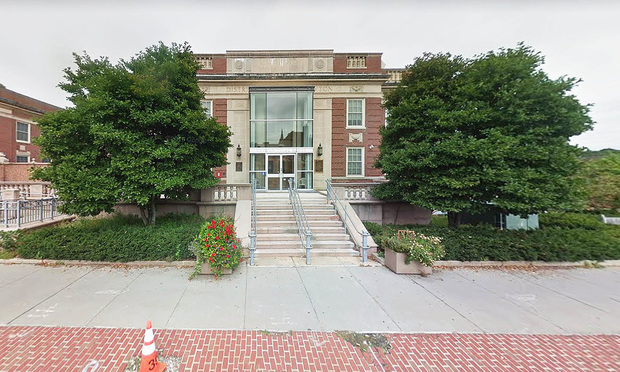61 Retired Jurists Support Judge Charged With Helping Man Escape ICE Arrest
"The prosecution at issue in this case, if permitted to go forward, will irrevocably tip the scales of justice," the retired judges wrote in support of Massachusetts District Court Judge Shelley M. Richmond Joseph.
September 16, 2019 at 02:29 PM
4 minute read
 Newton District Court in Massachusetts where Judge Shelley M. Richmond Joseph presides. Photo: Google
Newton District Court in Massachusetts where Judge Shelley M. Richmond Joseph presides. Photo: Google
Dozens of retired jurists have rallied behind a Massachusetts state judge indicted in April for allegedly obstructing justice by preventing an immigration official from arresting a man living in the U.S. without permission.
Massachusetts District Court Judge Shelley M. Richmond Joseph and trial court officer Wesley MacGregor face criminal prosecution for allegedly preventing a U.S. Immigration and Customs Enforcement officer from taking custody of the fugitive charged with narcotics possession. They were both indicted on one count of conspiracy to obstruct justice and two counts of aiding and abetting obstruction of justice. MacGregor also faces one count of perjury. If convicted of the obstruction charges, Joseph and MacGregor each face maximum sentences of up to 25 years in prison and fines of up to $250,000.
Prosecutors alleged the pair helped the defendant evade ICE custody in having him and his attorneys escorted through the back door of the courthouse while an ICE officer waited in the courthouse lobby.
But 61 retired Massachusetts judges showed their support for Joseph, creating the Ad Hoc Committee for Judicial Independence, which filed an amicus brief filed Monday in the U.S. District Court for the District of Massachusetts.
"The prosecution at issue in this case, if permitted to go forward, will irrevocably tip the scales of justice because it will undermine the very authorities that make balance possible," the retired judges wrote. "As argued in Joseph's motion to dismiss, the prosecution is contrary to law."
The brief added that prosecuting the judge would set a bad precedent.
"If it is crime for judges to perform judicial functions in a manner contrary to executive preferences, then federal and state prosecutors can prosecute judges whenever they deemed to have stymied the actions of law enforcement officers inside a courtroom," the retired judges wrote. "And, members of the public would have every reason to believe that their rights to due process, and to fair and public trials, will give way to the judiciary's interest in avoiding state or federal prison."
Such a prosecution "portends an unacceptable risk of criminal jeopardy that inevitably will chill the ability of state court judges to insure equal justice under the law without fear or favor to any person or point of view," the brief argued.
ICE declined to comment, citing "the fact that Judge Joseph's case is still under active prosecution by the Office of U.S. Attorney for the District of Massachusetts."
Prosecutors responded to the amicus brief Monday afternoon, arguing the committee's arguments resembled a brief already submitted by the judge's attorneys. For instance, the government claimed the committee's brief makes the same argument as Joseph, who claimed she has immunity against criminal prosecution for taking an action she considered to be "courtroom management."
"Two capable law firms representing Judge Joseph have submitted an exhaustive 31-page brief raising numerous legal arguments in support of their client's motion," U.S. Attorney Andrew Lelling wrote in the response. "The committee's proposed brief merely echoes the judicial immunity argument already fully developed in Judge Joseph's brief."
Joseph's attorney, Douglas Brooks of LibbyHoopes, did not respond to a request for comment Monday.
Matthew Segal and Daniel McFadden, both with the Boston-based American Civil Liberties Union Foundation of Massachusetts Inc., represent the ad hoc committee of retired judges. Neither attorney immediately responded to a request for comment Monday.
Read more:
Boston Judge, Ex-Court Officer Charged With Obstructing ICE Arrest
This content has been archived. It is available through our partners, LexisNexis® and Bloomberg Law.
To view this content, please continue to their sites.
Not a Lexis Subscriber?
Subscribe Now
Not a Bloomberg Law Subscriber?
Subscribe Now
NOT FOR REPRINT
© 2025 ALM Global, LLC, All Rights Reserved. Request academic re-use from www.copyright.com. All other uses, submit a request to [email protected]. For more information visit Asset & Logo Licensing.
You Might Like
View All


Trump Administration Faces Legal Challenge Over EO Impacting Federal Workers
3 minute read
Settlement Allows Spouses of U.S. Citizens to Reopen Removal Proceedings
4 minute readTrending Stories
- 1Thursday Newspaper
- 2Public Notices/Calendars
- 3Judicial Ethics Opinion 24-117
- 4Rejuvenation of a Sharp Employer Non-Compete Tool: Delaware Supreme Court Reinvigorates the Employee Choice Doctrine
- 5Mastering Litigation in New York’s Commercial Division Part V, Leave It to the Experts: Expert Discovery in the New York Commercial Division
Who Got The Work
J. Brugh Lower of Gibbons has entered an appearance for industrial equipment supplier Devco Corporation in a pending trademark infringement lawsuit. The suit, accusing the defendant of selling knock-off Graco products, was filed Dec. 18 in New Jersey District Court by Rivkin Radler on behalf of Graco Inc. and Graco Minnesota. The case, assigned to U.S. District Judge Zahid N. Quraishi, is 3:24-cv-11294, Graco Inc. et al v. Devco Corporation.
Who Got The Work
Rebecca Maller-Stein and Kent A. Yalowitz of Arnold & Porter Kaye Scholer have entered their appearances for Hanaco Venture Capital and its executives, Lior Prosor and David Frankel, in a pending securities lawsuit. The action, filed on Dec. 24 in New York Southern District Court by Zell, Aron & Co. on behalf of Goldeneye Advisors, accuses the defendants of negligently and fraudulently managing the plaintiff's $1 million investment. The case, assigned to U.S. District Judge Vernon S. Broderick, is 1:24-cv-09918, Goldeneye Advisors, LLC v. Hanaco Venture Capital, Ltd. et al.
Who Got The Work
Attorneys from A&O Shearman has stepped in as defense counsel for Toronto-Dominion Bank and other defendants in a pending securities class action. The suit, filed Dec. 11 in New York Southern District Court by Bleichmar Fonti & Auld, accuses the defendants of concealing the bank's 'pervasive' deficiencies in regards to its compliance with the Bank Secrecy Act and the quality of its anti-money laundering controls. The case, assigned to U.S. District Judge Arun Subramanian, is 1:24-cv-09445, Gonzalez v. The Toronto-Dominion Bank et al.
Who Got The Work
Crown Castle International, a Pennsylvania company providing shared communications infrastructure, has turned to Luke D. Wolf of Gordon Rees Scully Mansukhani to fend off a pending breach-of-contract lawsuit. The court action, filed Nov. 25 in Michigan Eastern District Court by Hooper Hathaway PC on behalf of The Town Residences LLC, accuses Crown Castle of failing to transfer approximately $30,000 in utility payments from T-Mobile in breach of a roof-top lease and assignment agreement. The case, assigned to U.S. District Judge Susan K. Declercq, is 2:24-cv-13131, The Town Residences LLC v. T-Mobile US, Inc. et al.
Who Got The Work
Wilfred P. Coronato and Daniel M. Schwartz of McCarter & English have stepped in as defense counsel to Electrolux Home Products Inc. in a pending product liability lawsuit. The court action, filed Nov. 26 in New York Eastern District Court by Poulos Lopiccolo PC and Nagel Rice LLP on behalf of David Stern, alleges that the defendant's refrigerators’ drawers and shelving repeatedly break and fall apart within months after purchase. The case, assigned to U.S. District Judge Joan M. Azrack, is 2:24-cv-08204, Stern v. Electrolux Home Products, Inc.
Featured Firms
Law Offices of Gary Martin Hays & Associates, P.C.
(470) 294-1674
Law Offices of Mark E. Salomone
(857) 444-6468
Smith & Hassler
(713) 739-1250










